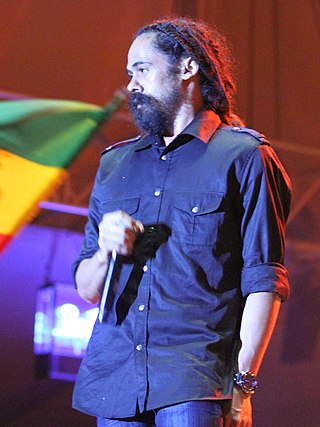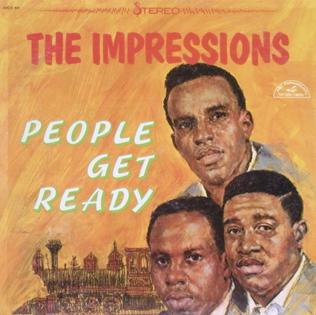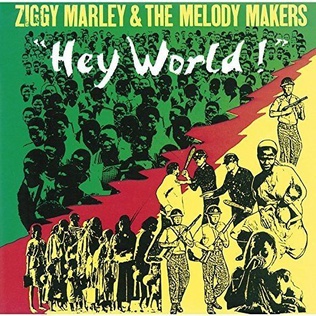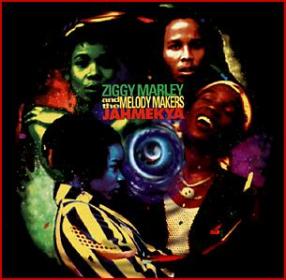
David Nesta "Ziggy" Marley is a Jamaican reggae musician. He is the son of reggae icon Bob Marley and Rita Marley. He led the family band Ziggy Marley and the Melody Makers until 2002, with whom he released eight studio albums. After the disbandment, Ziggy launched a successful solo career by having released eight solo studio albums on his own record company, Tuff Gong Worldwide. Ziggy continues his father’s heritage to record and self-release all of his music. Marley is an eight-time Grammy Award winner and a Daytime Emmy Award recipient.

Exodus is the ninth studio album by Jamaican reggae band Bob Marley and the Wailers, first released in June 1977 through Island Records, following Rastaman Vibration (1976). The album's production has been characterized as laid-back with pulsating bass beats and an emphasis on piano, trumpet and guitar. Unlike previous albums from the band, Exodus thematically moves away from cryptic story-telling; instead it revolves around themes of change, religious politics, and sexuality. The album is split into two halves: the first half revolves around religious politics, while the second half is focused on themes of making love and keeping faith.

Stephen Robert Nesta Marley is a Jamaican-American musician. The son of Bob Marley, Marley is an eight-time Grammy Award winner, three times as a solo artist, twice as a producer of younger brother Damian Marley's Halfway Tree and Welcome to Jamrock albums, and a further three times as a member of his older brother Ziggy Marley's group Ziggy Marley & The Melody Makers.

Damian Robert Nesta "Jr. Gong" Marley is a Jamaican DJ, singer, lyricist and rapper. He is the recipient of four Grammy Awards.

Julian Ricardo Marley is a British-Jamaican reggae musician, songwriter, producer and humanitarian. He is the son of reggae music icon Bob Marley, and Lucy Pounder.

"People Get Ready" is a 1965 single by The Impressions, and the title track from the People Get Ready album. The single is the group's best-known hit, reaching number-three on the Billboard R&B chart and number 14 on the Billboard Hot 100. The gospel-influenced track was a Curtis Mayfield composition that displayed the growing sense of social and political awareness in his writing.

True Democracy is an album by the reggae band Steel Pulse, released in 1982.

Ziggy Marley and the Melody Makers were a Jamaican-American reggae family group whose line-up consisted of the children of musicians, Bob Marley and Rita Marley, which includes lead singer Ziggy Marley with Sharon Marley, Cedella Marley, and Stephen Marley. Formed in 1979 in Brooklyn, New York, Ziggy Marley and the Melody Makers members began their musical endeavours in their pre-teens under the name the Melody Makers.

Hey World! is the second album by Ziggy Marley and the Melody Makers, released in 1986.

One Bright Day is the fourth album by Ziggy Marley and the Melody Makers, released in 1989. It won the Grammy Award for Best Reggae Album in 1990.

Jahmekya is a studio album by the reggae group Ziggy Marley and the Melody Makers, released in 1991.

Free Like We Want 2 B is an album by Ziggy Marley and the Melody Makers, released in 1995 by Elektra Records. It was nominated for a Grammy Award, in the "Best Reggae Album" category.

Higher Power is the seventh album by Big Audio Dynamite, released in 1994. First released in the US on 8 November, it was then released in the UK the following week on 14 November 1994. "Looking for a Song" was released as a single; it peaked at No. 24 on Billboard's Modern Rock Tracks chart. The band supported the album with a North American tour.
It's a Jungle in Here is an album by the experimental jazz funk trio Medeski Martin & Wood, released in 1993. The trio supported the album by playing shows with Bio Ritmo. "Bemsha Swing/Lively Up Yourself" is a medley of Thelonious Monk and Bob Marley.

Robert Nesta Marley was a Jamaican singer, musician, and songwriter. Considered one of the pioneers of reggae, his musical career was marked by fusing elements of reggae, ska, and rocksteady, as well as his distinctive vocal and songwriting style. Marley's contributions to music increased the visibility of Jamaican music worldwide, and made him a global figure in popular culture. Over the course of his career, Marley became known as a Rastafari icon, and he infused his music with a sense of spirituality. He is also considered a global symbol of Jamaican music and culture and identity, and was controversial in his outspoken support for democratic social reforms. In 1976, Marley survived an assassination attempt in his home, which was thought to be politically motivated. He also supported legalisation of marijuana, and advocated for Pan-Africanism.

Play the Game Right is the debut album by Ziggy Marley and the Melody Makers, released in 1985. The album was executive produced by Rita Marley.

"Could You Be Loved" is a 1980 song by Jamaican reggae band Bob Marley and the Wailers. It was released as the first single from their twelfth and last album, Uprising (1980), and is also included on their greatest-hits album Legend (1984). It was written in 1979 on an aeroplane while The Wailers were experimenting on guitar. In the middle of the song, background singers quote a verse from Bob Marley's first single "Judge Not": "The road of life is rocky; And you may stumble too. So while you point your fingers, someone else is judging you". Instruments used on the original record of this song are guitars, bass, drums, acoustic piano, the Hohner clavinet and an organ, as well as the Brazilian cuíca. "Could You be Loved" was very successful on the charts in Europe, peaking within the top 10 in Belgium, France, Ireland, Italy, the Netherlands, Norway, Spain, Switzerland and the UK. Additionally, it was a top 20 hit in Sweden and West Germany.
The discography of Ziggy Marley and the Melody Makers, a Jamaican reggae family group, consists of ten studio albums, one live album, four compilation albums, twenty-three singles and four video albums.
The following outline is provided as an overview of and topical guide to Bob Marley:

Pillow Lips is an album by the English band Modern English, released in 1990. It contains a rerecorded version of "I Melt with You", which charted.

















